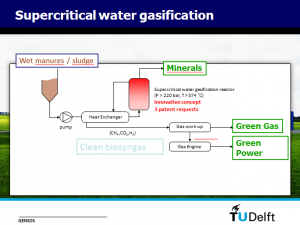Sustainability analysis of a new biomass gasification system to produce substitute natural gas based on manure
Graduation Proposal – MSc Programme SPET
Project title: Sustainability analysis of a new biomass gasification system to produce substitute natural gas based on manure
Supervision
- Dr. W. (Wiebren) de Jong (Process and Energy - Faculty 3mE, TU Delft), Wiebren.deJong@tudelft.nl
- Onursal Yakaboylu, MSc. (Process and Energy - Faculty 3mE, TU Delft), O.Yakaboylu@tudelft.nl
- Dr. G. (Gijsbert) Korevaar (Energy and Industry - Faculty TBM, TU Delft), G.Korevaar@tudelft.nl
Background
Gensos BV (located in Breezand, NL; www.gensos.nl) is about to launch a new type of wet biomass (mainly manure) gasification for production of substitute natural gas. Together with the JRC-Institute for Energy and Transport (http://iet.jrc.ec.europa.eu, located in Petten, NL) and the Process and Energy Department at the TU Delft, an evaluation method will be applied to learn about the sustainability gains and possible improvement of this new technology. The TU Delft has developed a thermochemical phase equilibrium model of the system that can be used for further exploration of the gasification process and which has been the basis of the development of this new technology. JRC-IET is the main actor in the calculation of typical and default greenhouse gas emissions from solid, liquid and gaseous biofuels used by the European Commission in its climate and energy policy (e.g. Directive 2009/28/EC).
Research layout
The research will consist in the following steps:
1) Extensive literature review to the existing processes and LCA’s of wet biomass gasification systems for the production of substitute natural gas, including a detailed study on benchmark systems (e.g. anaerobic digestion) and allocation methods. In addition, a literature study to possible application of the nutrients from the waste flows on fields and their accompanying cycle.
2) Carrying out an LCA of anaerobic digestion of manure with a specific attention to the flows of nutrients in that system and their possible agricultural use. This LCA will function as a benchmark for the next parts of the project. JRC-IET has already extensive and verified data for this pathway that can be used as a starting point for the work.
3) Carrying out an LCA of the new gasification method included in the same system as used above, but in this case based on the thermochemical model of the gasification process.
4) In the systems above (based on the thermochemical model), also experimental data from Onursal Yakaboylu’s research project can be included for validation and evaluation. These data will be available after December 2013.
5) Final evaluation and reflection on the sustainability of the system including the newly developed gasification process, leading to recommendations for further improvements of the sustainability of the system.
Since parts of the information related to the process under study are still confidential, the description above just speaks about ‘a gasification process’. If still relevant at the start of the project, the student can be requested to sign an NDA in order to get sufficient access to all information on the gasification process and its experimental data. From the student it will be asked to work closely together with Gensos B.V. (in Breezand) and JRC (in Petten) and be present on location in Breezand or Petten for at least two days a week on average (can also be 40% of the total project time as one period).

Chair:
Energy Technology
Involved People:
Dr.ir. Onursal Yakaboylu
Prof.Dr.ir. Wiebren de Jong
Facilities used: